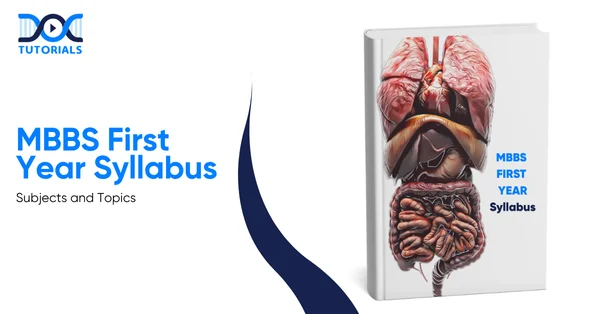MBBS First Year Subjects: Syllabus and Topics

If you’re preparing for your MBBS journey, knowing the first year syllabus of MBBS is essential. The first year lays the groundwork for your medical profession, and it will be beneficial to learn the subjects in advance. The 1st year MBBS syllabus is divided into semesters and includes three main pre-clinical subjects: Anatomy, Biochemistry, and Physiology.
Along with the syllabus, it is crucial to know about the sub-branches in-depth, along with the recommended books that will help you study. In this guide, we will explore a brief description of what and how you can learn from your MBBS first-year syllabus.
Keep reading for a detailed insight.
MBBS First Year Subjects & Syllabus
In the first year of MBBS, students have the opportunity to study 3 core subjects that constitute the foundation of medical sciences. They include:
- Anatomy
Anatomy covers the exploration of the organisation and structure of the human body. It describes bones, muscles, joints, organs, and tissues, and how they are connected to one another.
It is necessary to study thoroughly since it gives a structural and visual comprehension of the body so that future physicians can better understand disease and conduct clinical practice. The students are taught how the different systems communicate with one another and work together to maintain the body in balance and in good health overall.
- Biochemistry
Biochemistry delves into the body at the chemical and molecular levels. It studies significant processes like metabolism, enzymatic activity, genetic material, and the biochemical function of vitamins and hormones.
- Physiology
Physiology is concerned with the manner in which the human body operates at the cellular and systemic levels. It outlines the functioning of systems like the cardiovascular, nervous, respiratory, renal, and endocrine systems.
With the 1st year MBBS Biochemistry syllabus, students can get educated on how different chemical reactions maintain life and how their imbalances cause diseases.
Sub-branches of the MBBS First Year Subjects
All 3 subjects have their own elaborate syllabus through which students are introduced to theoretical knowledge as well as its application. The following is an overview:
- Anatomy Sub-branches
The subject of Anatomy is vast, and its syllabus is divided into different branches to help students understand the body systematically. Here is the Anatomy syllabus for MBBS first year:
- Gross Anatomy: This department teaches students the basics of anatomy, such as the definition, body positions, body planes, tissues, and movements. It forms the basis of learning the intricate composition of various parts of the body.
- Muscular System: Here, students learn about the grouping of muscles, identification of the muscles, origin, insertion points, innervation, and microscopic arrangement of the muscle tissue. It also involves the way the muscles respond to nerve endings in order to produce movement.
- Arthrology: It deals with the examination of joints, their definition, classification, and fundamental features. The subject involves the study of big limb joints, their structure, movements, and microscopic anatomy, like articular cartilage and synovial fluid.
- Biochemistry Sub-branches
The study of Biochemistry is organised into specific sections that explain the molecular processes and their clinical significance. Following is the Biochemistry 1st year MBBS syllabus:
- Biomolecules: This section of the Biochemistry syllabus MBBS 1st year deals with the classification and role of carbohydrates, proteins, lipids, and amino acids. Students are also introduced to molecular mechanisms, plasma protein function, their role in the body, and their clinical importance.
- Enzymes: This subject covers the fundamentals of enzymes, including nomenclature, classification, kinetics, and mode of action. It also addresses how the action of the enzymes is controlled and why enzymes are an essential component of metabolic reactions.
- Metabolic Pathways, Their Regulation and Interrelationships: In this subject of Biochemistry syllabus for MBBS 1st year students learn about the metabolism of lipids, proteins, carbohydrates, and the tricarboxylic acid (TCA) cycle.
It also emphasises the coordination of such metabolic reactions, assimilation of food, nutrition, and the role of energy production in sustaining life.
- Physiology Sub-branches
The syllabus of Physiology provides students with a clear understanding of how the body’s separate systems function individually and in coordination with each other. The topics include:
- General Physiology: This unit familiarises students with fundamental physiological concepts, including homeostasis, body regulating mechanisms, cellular physiology, and effective learning approaches in physiology. It forms the basis for a more detailed study of the organ systems.
- Nerve-Muscle Physiology: This topic covers cell membrane physical and chemical characteristics, bioelectric principles, resting membrane potential genesis, action potential, and functional anatomy of the nerve and muscle tissue.
- Blood Environmental: Here, the students study plasma proteins and their role, hematopoiesis, anaemia types and causes, functions of white blood cells, hemostasis, blood groups, functions of platelets, and mechanisms for the regulation of normal physiology of blood.
List of MBBS 1st Year Books
The books of the MBBS first year syllabus for 1st semester are recommended by the Medical Council of India (MCI). They are generally used in medical colleges, and the students also recommend them for advanced knowledge. They provide a solid foundation for a better understanding of the concepts.
The tabulated list of some key recommended books is as follows:
| Subject | Book Name | Author(s) |
| Anatomy | Textbook of Anatomy: Upper Limb and Thorax Vol. 1 | Vishram Singh |
| Anatomy | Textbook of Anatomy | Vishram Singh |
| Physiology | Human Physiology | Chandi Charan Chatterjee |
| Physiology | Medical Physiology | Guyton and Hall |
| Biochemistry | Textbook of Biochemistry for Medical Students | Damodaran M. Vasudevan, S. Sreekumari |
| Medical Embryology | Textbook of Medical Embryology | Langman’s |
| Biology | Molecular Biology | Vasudevan |
How to Make the Syllabus Work for Proper Study?
After knowing the MBBS first-year syllabus well, now it’s time to plan it smartly to organise your studies. The following are some practical tips that can help you use it in the best possible way:
- Subject Breakdown
Rather than attempting to study the whole syllabus at one time, break it into compartments. Study one subject or sub-topic at a time to develop clarity and avoid confusion.
- Prepare a Timetable
Develop a realistic timetable by assigning specific time intervals for every subject. Spend more time on your weak subject areas, but never at the expense of losing regularity on all subjects. Following the schedule develops a certain level of discipline needed for steady progress.
- Regular Revision
Revision is the secret to memorisation. Go through the portions covered earlier at regular intervals. This not only consolidates your knowledge but also improves long-term memory, which comes in handy while preparing for exams.
- Make Use of Diagrams and Charts
Subjects like Anatomy are highly diagrammatic in nature. When you are learning, using charts, flow charts, and simple hand-drawn figures will make it easier to memorise and enhance your recall when you are taking exams.
FAQs about MBBS First Year Syllabus
- How many subjects are there in the first year of MBBS?
MBBS is divided into 3 subjects in the first year, which are Anatomy, Biochemistry, and Physiology. These are the core of advanced medical education and form the major part of the early semesters.
- What is the first year MBBS syllabus?
Anatomy, Biochemistry, and Physiology are the core subjects studied in the first year of study. Other topics include learning gross anatomy, microanatomy, biomolecules, enzymes, metabolic pathways, blood physiology, nerve-muscle functions, and food assimilation.
These learnings give a close understanding of the human body structure, functions, and chemical processes.
- Is the 1st year of MBBS hard?
Yes, the first year of MBBS is generally one of the most challenging phases. The syllabus is vast and entirely new to the majority of students. However, students can adapt to the load with proper management of time, continued revision, and focus on the three important subjects.
- What is the most difficult subject in the MBBS first year?
Difficulty level is different for every student, but Anatomy is generally considered the most challenging subject in the first year. It’s because it encompasses a huge amount of factual information, diagrams, spatial visualisation, and memorisation. It becomes difficult for most students to memorise the complex structures of the human body.
- Is there any Physics in the MBBS first year?
Yes, though Physics, Chemistry, and Biology are mostly covered during the pre-medical phase, they still have relevance in MBBS. Physiology and Biochemistry make use of concepts of Physics, like concepts of bioelectricity and fluid dynamics, and are thus indirectly part of the first-year syllabus.
Conclusion
The MBBS 1st year syllabus is the base of medical education, with Anatomy, Physiology, and Biochemistry being the cornerstone. With expert guidance and systematic learning assistance from DocTutorials, students can approach the first year with ease and lay a solid base for their future medical career.
For students preparing for MBBS, DocTutorials is a trustworthy medical education platform. Our in-depth MBBS curriculum includes 2D & 3D animated lectures, Qbank, and previous year question papers.
Join DocTutorials today to excel in your medical exam!
Latest Blogs
-

INI CET Exam Pattern 2025: A Complete Guide with Subject-Wise Weightage
The Institute of National Importance Combined Entrance Test (INI CET) is your key to entering some of the most prestigious…
-

NEET PG Registration 2025: An Essential Guide For Exam Prep
The NEET PG registration, which is conducted online, is a crucial step in the exam process. Filling out the NEET…
-

NEET PG Syllabus 2026: A Must-Have Complete Guide for Exam Success
The NEET PG Syllabus acts as one of the foundation stones for aspiring postgraduate medical students like you who are…




